The IOPN Diploma in Sports Nutrition: Course modules
Find out the topics you’ll study in each module and the practical assignments that will enable you to coach a variety of clients.

Module 1: Human nutrition and exercise metabolism
This module aims to provide students with a thorough overview of the fundamental theory of the relevant elements of exercise physiology, exercise metabolism and human nutrition and its practical translation to working with recreational and professional athletes and team sports in practice.
Upon successful completion of this module, students should be able to:
- Explain the role, function, composition, and requirements of nutrients and non-nutrients, as well as their impact on human physiology and how they are researched to inform public health nutrition guidelines.
- Evaluate retrospective and prospective dietary intake assessment methods and understand the process of maintaining a dietary record in practice.
- Know the effects of nutrient excess and or/deficiency on metabolic and physiological function.
- Understand the evidence of certain nutrients and food groups on various health indices and their global environmental impact, as well as the different country-specific healthy eating guidelines.
- Understand the regulations behind food labelling and techniques of food processing.
- Understand the structure and function of skeletal muscle and the biochemical and metabolic processes of substrate regulation to facilitate energy production at rest and during exercise.
- Describe the training /nutrient-induced adaptations in athletes and the potential causal mechanisms of fatigue during exercise.
- Understand the process and practical relevance of common physiological and metabolic measurements performed in sport and exercise nutrition research.
- Understand the components of human metabolism and their contribution to non-athletes and athletes.
- Critically appraise the application of measures of human energy expenditure and know how to quantify energy expenditure in practice.
- Understand the concepts of energy balance/availability and how to determine the energy status of an individual.
Students will work with the following case subjects throughout Module 1.
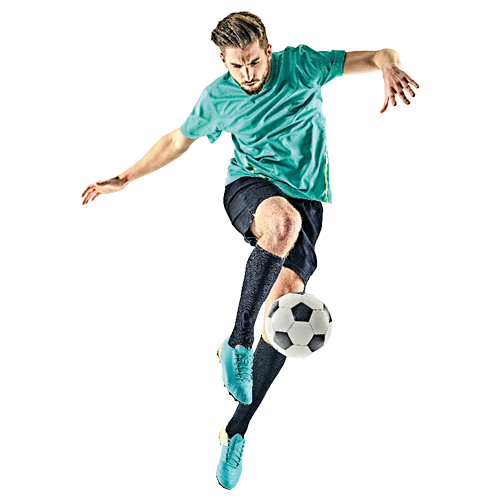
A professional male soccer player
Advise the athlete on how to keep a reliable, accurate food record and analyse the athlete's logged data.
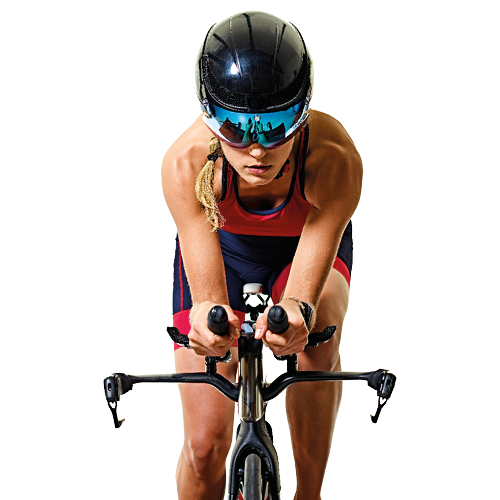
A female competitive triathlete
Determine which nutrients and non-nutrients may be causing the athlete gastrointestinal issues during exercise and devise a meal plan to alleviate symptoms.

A female professional boxer
Propose healthy eating guidelines aligned to the athlete’s training when eating out of the home and develop strategies to increase autonomy in meal planning and nutrition decisions.
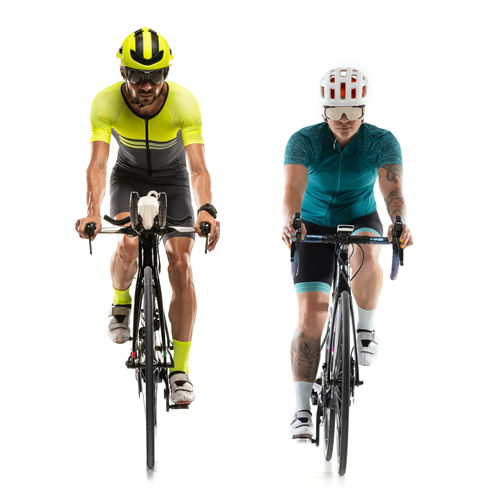
A group of male and female elite road cyclists
Determine the energy availability of cyclists using different proxy measures of energy status

A female marathon runner (portfolio assignment)
Provide instructions that enable an athlete to record their dietary intake accurately and propose nutritional strategies to ensure nutritional adequacy when adopting a vegan diet. Produce a comprehensive client report and analysis of the athlete. Propose a nutrition strategy for the athlete that supports their health and performance.
Unit 1: Nutrients and recommended intakes [±14 hrs study time]
Unit 2: Healthful diets and sustainable eating [±10 hrs study time]
Unit 3: Skeletal muscle: structure, function, plasticity [±16 hrs study time]
Unit 4: Skeletal muscle energy metabolism during exercise [±16 hrs study time]
Unit 5: Nutrition and fatigue [±8 hrs study time]
Unit 6: Energy [±11 hrs study time]
Students will acquire the following practical skills throughout this module:
- Instruct an athlete on how to maintain a dietary record in practice and evaluate the accuracy and reliability of a completed food log.
- Create a bespoke nutrition plan for an athlete that reduces the risk of gastrointestinal symptoms during exercise.
- Propose food label instructions to fulfil healthy eating or sports nutrition guidelines when athletes shop at the supermarket.
- Create educational resources for athletes that help them adhere to sports nutrition recommendations when dining out of the house.
- Create a detailed client report and nutritional analysis from a comprehensive nutritional assessment.
- Calculate the energy expenditure of athletes at rest and during various modes of exercise.
- Determine an athlete’s energy availability using various proxies of energy status.
- Develop nutritional recommendations for an athlete to optimise energy availability and athletic performance.
- Professor Graeme Close (PhD)
- Professor Craig Sale (PhD)
- Professor James Morton (PhD)
- Professor James Betts (PhD)
- Professor Dylan Thompson (PhD)
Module 2: Sport and Exercise Nutrition
(Digestion and Intestinal Absorption & Macronutrients)
This module aims to provide students with a thorough overview of the essentials of sports nutrition, covering the science and practical application of human digestion and intestinal absorption and the macronutrients for health and sports performance.
Upon successful completion of this module, students should be able to:
- Describe the functions and anatomical components of the gastrointestinal system.
- Understand the digestion and absorption kinetics of nutrients during rest and exercise.
- Understand dietary techniques for altering the metabolic and immunological activity of human gut bacteria.
- Know the types of nutrients and exercise stimuli that influence gastric emptying and practice implementing dietary recommendations to prevent common gastrointestinal symptoms during exercise.
- Know how to “train” the gut to enhance nutrient absorption by applying certain dietary strategies.
- Know the history of carbohydrate research in sport and exercise nutrition. Describe the types and structures of carbohydrates, as well as their effects on the digestive tract.
- Understand the impact of carbohydrate availability on metabolic regulation and performance, as well as the impact of exercise on carbohydrate metabolism.
- Understand how to implement carbohydrate-specific dietary strategies to fuel an athlete’s sporting activities (before, during, and post- exercise/competition).
- Understand how to periodise an athlete’s carbohydrate intake in accordance with the goals of the session.
- Know the history of lipid research in sport and exercise nutrition.
- Understand how to appraise sport and exercise nutrition research and its translational potential.
- Describe the structure, regulation, and metabolism (biochemical and physiological) of lipids at rest and during exercise.
- Understand the impact of high-fat and fat supplementation on exercise performance.
- Know how to perform a FATMAX test and appraise the results of metabolic exercise tests.
- Know the structure and functional roles of protein in the human body. Understand protein turnover at rest and during different dietary conditions and forms of exercise.
- Appraise the types of assessments used to research protein turnover.
- Discuss the regulation and metabolism of protein during exercise. Appraise the current RDA recommendations for dietary protein.
- Know how to apply dietary strategies that optimise protein turnover for athletes in a caloric deficit and athletes who adopt a plant-based diet.
- Discuss the health risks of protein consumption and appraise the utility of popular protein ergogenic aids.
Students will work with the following case subjects throughout Module 2.

An elite-level female biathlete
Propose a dietary intervention to relieve gastrointestinal symptoms during exercise.

A professional soccer team
Create a series of carbohydrate-specific nutritional strategies to improve recovery between back-to-back soccer matches.
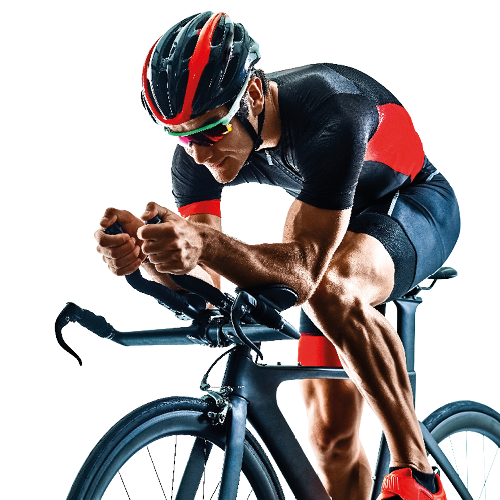
An elite-level male road cyclist
Create a competition-specific fuelling plan during a road-cycling event.
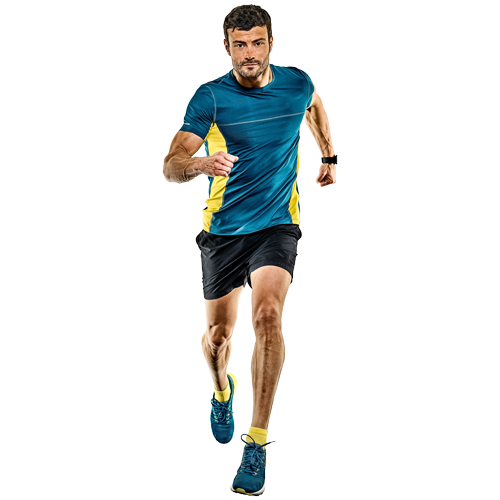
A recreational marathon runner
Analyse the outcomes of a metabolic exercise test.

A high-level amateur ultra-endurance athlete (portfolio assignment)
Assess the metabolic demands of the athlete’s training, apply nutritional strategies to mitigate gastrointestinal issues during exercise, and improve an athlete's carbohydrate oxidation capacity. Periodise the athlete's nutrient intake to correspond with the training session's objectives. Develop a nutrition strategy for an ultra-endurance IRONMAN event.
Unit 1: Gastric emptying, digestion, and absorption [±12 hrs study time]
Unit 2: Carbohydrates [±18 hrs study time]
Unit 3: Lipids [±20 hrs study time]
Unit 4: Protein [±18 hrs study time]
Students will acquire the following practical skills throughout this module:
- Develop a questionnaire to assess gastrointestinal (GI) symptoms during exercise and apply nutritional strategies to alleviate GI symptoms.
- Design nutritional strategies and recipes for post-match recovery in team sports.
- Understand how muscle biopsies, VO2 max, lactate threshold and FATMAX tests are performed and appraise the results of each assessment.
- Periodise an endurance athlete’s carbohydrate intake that aligns with the goals of their training.
- Design a carbohydrate-loading nutritional strategy before an endurance event.
- Design a nutritional strategy to optimise fueling during an ultra-endurance event.
- Propose dietary strategies to promote high-quality weight loss.
- Design a dietary strategy to optimise protein turnover in a vegan athlete.
Dr Gethin Evans (PhD)
Professor Leigh Breen (PhD)
Dr Oliver Witard (PhD)
Professor James Morton (PhD)
Professor James Betts (PhD)
Dr Scott Robinson (PhD)
Module 3: Sport and Exercise Nutrition
(Micronutrients & Supplementation)
This module aims to give students a thorough understanding of fluid requirements for professional and recreational athletes in individual and team sports, the significance of micronutrients in health and performance, and an evidence- based overview of dietary supplements for athletes.
Furthermore, the module aims to teach students how to critically appraise dietary supplement research, conduct a nutritional assessment of an athlete’s micronutrient status, conduct a needs-analysis of dietary supplement requirements, and provide resources to help students assist athletes in adhering to anti-doping rules.
Upon successful completion of this module, students should be able to:
- Explain the role of thermoregulation in athletes and the relevance of monitoring wet-bulb globe temperature (WBGT) levels.
- Discuss the health and performance consequences of hypohydration and how to circumvent its occurrence with athletes with customised fluid strategies.
- Understand the mechanisms of heat illness and strategies that assist with body cooling. Know the health and performance impact of fluid intake before and during exercise and practical fluid intake strategies for effective hydration in training and competition.
- Know the hydration requirements and composition for effective fluid replenishment during and after exercise. Understand how to assess hydration status in an athlete.
- Understand the function, role, and requirements of micronutrients related to metabolism, health, and performance; micronutrient amounts found in food; athlete groups susceptible to micronutrient insufficiency; assessment of micronutrient status and health/ergogenic impact of specific micronutrient supplementation.
- Understand how to provide food-first and supplemental strategies to improve the micronutrient status of athletes.
- Know how to critically appraise dietary supplementation research.
- Understand what sports foods, nutrient-based supplements, and ergogenic aids have efficacy and in what scenarios.
- Understand the concept of a ‘food first (not food only)’ approach.
- Know how to pragmatically discern the effectiveness of a dietary supplement for an athlete.
- Understand the various types, mechanisms, timing, and evidence-based dosing regimens of nutrient-based supplements and ergogenic aids, as well as the dangers and risks associated with sports nutrition supplementation.
- Practise using dietary supplement disclaimer forms and a supplement checklist.
- Understand the role of hormones on fuel use at rest and during exercise and the influence of adrenaline and insulin on glycogenolysis, lipolysis and glycogenesis.
- Know the function of allosteric effectors for regulating enzyme activity and the role of AMPK as a signalling molecule.
- Understand the predominant fuels for exercise metabolism and their regulation related to exercise intensity, duration, nutrition, and training status.
- Know the relevant ergogenic aids related to substrate support and fatigue mechanisms.
Students will work with the following case subjects throughout Module 3.
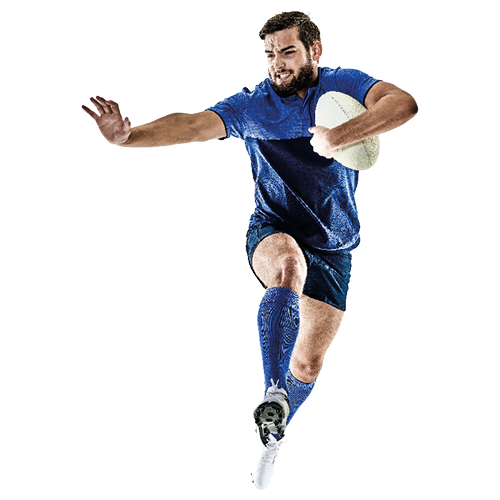
A team of professional rugby union athletes
Demonstrate an understanding of vitamin D’s role in health and athletic performance. Know how to assess vitamin D levels in athletes with different skin tones and general dosage guidelines in accordance with an athlete’s vitamin D status.
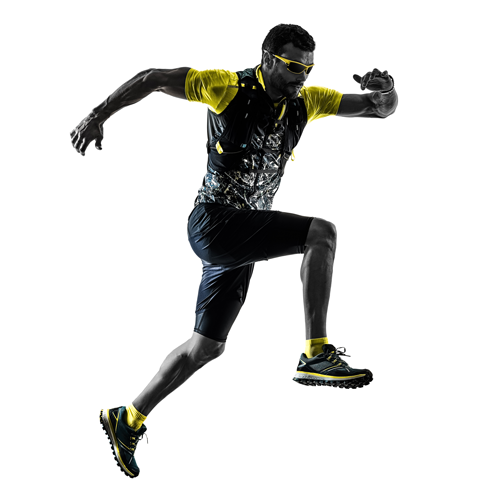
An NCAA Division 1 cross-country runner
Evaluate the circumstances that may have led to an athlete’s low iron levels. Analyse biochemical blood markers associated with iron status and provide food-first recommendations to help an athlete improve their iron levels.

A master’s degree student in Exercise Physiology
Explain how certain metabolic responses and regulatory mechanisms are affected by high-intensity intermittent exercise.

A team of professional soccer players
Advise athletes on monitoring their hydration status and develop fluid recommendations for athletes who display signs of hypohydration. Quantify the sweat rate of athletes and design bespoke fluid intake regimens for each athlete. Support athletes in staying adherent to anti-doping rules. Explain the efficacy of certain ergogenic aids on soccer performance, and know how to log and monitor dietary supplement use in professional athletes.
Unit 1: Water requirements and balance [±14 hrs study time]
Unit 2: Micronutrients [±17 hrs study time]
Unit 3: Nutrition Supplements [±20 hrs study time]
Unit 4: Metabolic Regulation [±20 hrs study time]
Students will acquire the following practical skills throughout this Module:
- Plan, implement, and evaluate a sweat-rate assessment in a team of professional athletes.
- Create resources to assist athletes in assessing their own hydration status.
- Understand how to assess and correct an athlete’s micronutrient status.
- Know how to prescribe specific sports foods, nutrient-based supplements, and ergogenic aids in practice.
- Practice communicating dietary changes to athletes who speak a different language.
- Understand how to safeguard athletes from committing a doping violation.
Dr Gethin Evans (PhD)
Dr Lewis James (PhD)
Professor Craig Sale (PhD)
Dr Daniel Owens (PhD)
Professor Graeme Close (PhD)
Professor Andrew Jones (PhD)
Dr Scott Robinson (PhD)
Professor James Morton (PhD)
Module 4: Advanced Sports Nutrition
This module is designed to provide students with an overview of contemporary research topics in sport and exercise nutrition, such as immune health and the athlete, the function of nutrition in modulating training adaptation, weight management strategies, and personalised nutrition.
Furthermore, the module aims to provide students with practical opportunities to implement nutritional strategies to meet an athlete's metabolic demands, training goals and augment training-induced adaptations, manipulate body composition for competition, assign behavioural strategies to achieve specific nutrition recommendations, and think critically about study design when investigating certain topics covered in this module.
Upon successful completion of this module, students should be able to:
- Discuss the main training-induced adaptations to endurance and resistance exercise, as well as the molecular causes of these changes.
- Understand when and how to employ periodised nutrition strategies to augment training- induced adaptations.
- Describe the molecular, cellular, and organ-level changes caused by exercise, as well as their respective timings during the training process.
- Discuss how substrate availability and antioxidants affect signalling, protein synthesis, and training adaptation.
- Understand the effects of nutrition on recovery from injuries and how to create a nutrition strategy to expedite an athlete’s rehabilitation.
- Understand the main components and functional mechanisms of the immune system and common illnesses and allergies experienced by athletes.
- Understand the difference between infection, allergy, and intolerance and appraise common techniques for testing these conditions.
- Understand the effects of exercise on immune function and infection risk, as well as recent advances in the concepts such as immune resistance and tolerance in athletes.
- Explain nutrition’s influence on immune function (purported mechanisms, macronutrients, and micronutrients) and strategies to improve immune resistance and tolerance.
- Evaluate research-relevant and applied body composition techniques and how to prepare an athlete to improve the accuracy and reliability of the assessment.
- Understand how appetite is regulated and dietary strategies that influence satiety.
- Understand what factors regulate energy balance and practice implementing behavioural and dietary strategies to manipulate an athlete’s body composition safely.
- Understand the mechanisms that cause metabolic adaptation.
- Understand the concept of ‘energy availability’ in sport and exercise and how to measure it, as well as how to implement nutritional strategies to prevent chronic low energy availability in athletes.
- Know the characteristics, prevalence and risk factors of eating disorders and the health and performance impact.
- Know how to build trust with clients.
- Understand how to implement behaviour change techniques to deliver nutrition recommendations.
- Understand the nutritional considerations for different age groups, gender, specific sports, and situations.
- Develop a periodised nutrition plan over the course of a calendar year for an athlete. Understand the evolving area of nutrigenomics in sport and exercise nutrition.
Students will work with the following case subjects throughout Module 4.

An elite-level triathlete
Describe the fundamental molecular, cellular, and physiological/metabolic processes that underpin exercise-induced endurance adaptations. Periodise a nutrition approach that aims to augment the athlete’s training response.

A CrossFit athlete
Describe best-practice pre-assessment protocols for applied body composition techniques and appraise their efficacy for longitudinal monitoring of body composition. Determine weight-loss targets for an athlete and propose a nutritional strategy to achieve high-quality weight loss.

A professional soccer player
Explain the physiological repercussions of limb immobilisation and implement a nutrition strategy to circumvent pronounced losses in skeletal muscle mass during different stages of recovery.

An elite-level triathlete
Estimate the metabolic demands of the athlete’s training programme and provide nutritional recommendations that aim to periodise the athlete's nutritional intake in accordance with the metabolic demands and the athlete’s training goals.
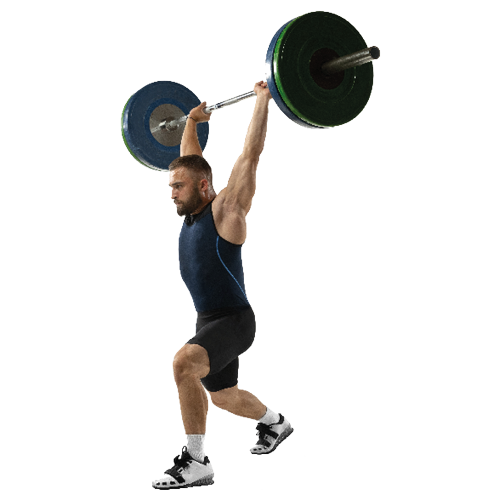
An Olympic weightlifter
Propose dietary strategies that assist the athlete in achieving high-quality weight loss and practice communicating nutritional strategies to the athlete. Ask the athlete questions that help identify facilitators or inhibitors to the athlete’s target behaviour. Translate proposed weight-loss nutritional targets into meal plans. Propose safe acute-weight loss strategies to ensure the athlete ‘makes weight’ for competition.
Unit 1: Nutrition and training adaptation [±17 hrs study time]
Unit 2: Nutrition and immune function in athletes [±14 hrs study time]
Unit 3: Body composition, weight management and eating disorders [±24 hrs study time]
Unit 4: Personalised Nutrition [±18 hrs study time]
Students will acquire the following practical skills throughout this module:
- Periodise nutritional strategies that aim to augment an athlete’s adaptation to training.
- Understand ‘best-practice’ pre-assessment protocols for improved accuracy and reliability when assessing body composition.
- Recognise athletes who are at risk of or suffering from an eating disorder.
- Estimate how much weight an athlete will need to lose to reach their body composition objectives and establish a nutrition strategy to get there.
- Understand how to develop a nutritional programme for an injured athlete.
- Develop a nutritional programme with meal plans to achieve high-quality weight loss.
- Understand how to implement safe, acute-weight-making techniques to ensure an athlete ‘makes weight’ for competition.
- Understand how to establish trust and communicate nutritional recommendations to clients.
- Identify and implement behavioural techniques that facilitate nutritional recommendations.
Dr David Lee Hamilton (PhD)
Professor Glen Davison (PhD)
Professor Dylan Thompson (PhD)
Dr Daniel Owens (PhD)
Professor Graeme Close (PhD)
Professor James Morton (PhD)
Professor James Betts (PhD)
Dr Javier Gonzalez (PhD)
Dr Oliver Witard (PhD)
Professor Kirsty Elliott-Sale (PhD)
